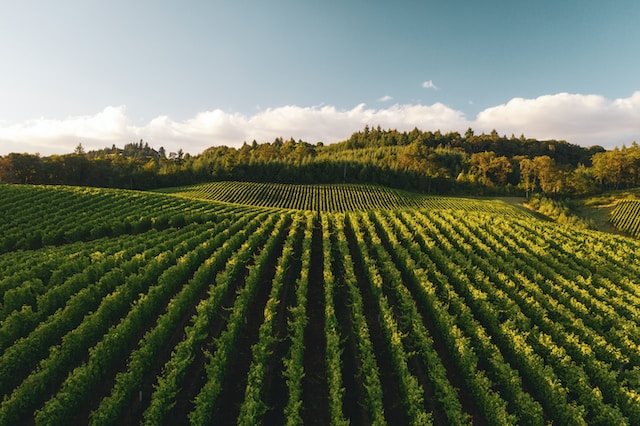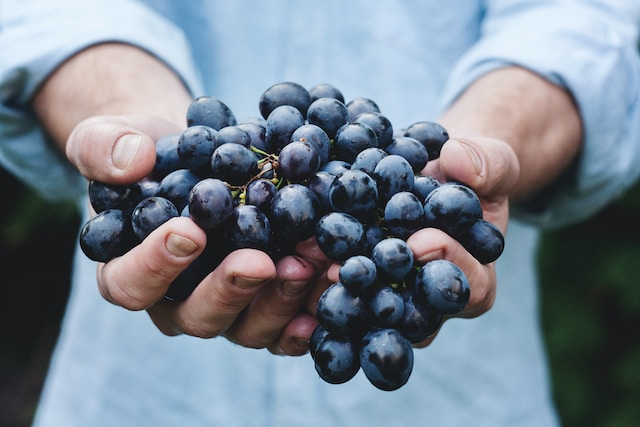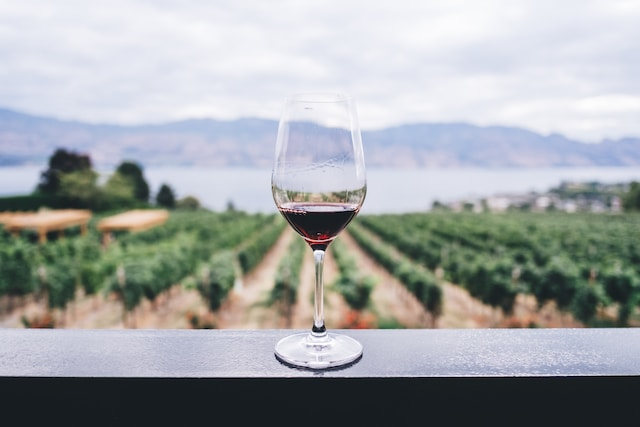Portugal is a treasure trove for wine enthusiasts. From the lush, terraced vineyards of the Douro Valley to the sun-drenched plains of Alentejo and the scenic landscapes of the Algarve, each region offers its unique twist on winemaking. This guide delves into the diverse and enchanting world of Portuguese wineries, showcasing the best vineyards that embody the tradition, innovation, and passion of Portuguese viticulture.

Top 10 Must Visit Vineyards in Portugal
The top 10 must visit vineyards in Portugal are listed below.
-
Lagoalva
-
Taylor’s Port
-
Quinta do Noval
-
W&J Graham’s Port
-
Dow’s Port
-
Fonseca Port
-
Quinta do Vesuvio
-
Cockburn
-
Quinta do Vale Meao
-
Warre’s
Lagoalva
Lagoalva, nestled in the Tejo region, stands out for its modern approach to winemaking. This vineyard, with over 45 hectares of vines, produces an array of wines, notably rich reds and vibrant whites. Their state-of-the-art winery, combined with traditional methods, results in wines that perfectly capture the essence of the region.
Taylor’s Port
Taylor’s Port, located in the Douro Valley, is renowned for its exquisite port wines. As one of the oldest port houses, it offers a blend of tradition and innovation. Visitors often marvel at their extensive cellars and are captivated by the rich flavors of their tawny and vintage ports.
Quinta do Noval
Quinta do Noval, also in the Douro Valley, is famous for its national vintage port. The vineyard's picturesque setting is complemented by its unique approach to winemaking, focusing on quality and exclusivity. Their terraced vineyards are a testament to the region's winegrowing heritage.
W&J Graham’s Port
W&J Graham’s Port in Vila Nova de Gaia is celebrated for its superb range of port wines. Their cellars, filled with oak barrels aging fine ports, offer an immersive experience. The vineyard’s expertise in crafting exceptional ports is evident in every sip.
Dow’s Port
Dow’s Port, another jewel in the Douro Valley, is known for its robust and aromatic ports. Their vineyards are located in some of the valley’s most elevated areas, contributing to the distinct flavor profile of their wines.
Fonseca Port
Fonseca Port, with its rich history, stands out for its luxurious and fruity ports. The vineyard's commitment to sustainability and quality is apparent in their organic viticulture practices and the complex flavors of their wines.
Quinta do Vesuvio
Quinta do Vesuvio, one of the Douro Valley’s largest estates, is famed for its grand vintage ports. The traditional foot-treading method used here enhances the intensity and complexity of their ports, making them highly sought after.
Cockburn
Cockburn, a name synonymous with quality, offers a range of ports that cater to various palates. Their vineyards in the Douro Valley are meticulously cared for, ensuring the highest quality of grapes for their renowned ports.
Quinta do Vale Meao
Quinta do Vale Meao in the Upper Douro is a testament to innovation in winemaking. Their focus on single-varietal wines sets them apart, and their dedication to producing expressive and balanced wines is evident in every bottle.
Warre’s
Warre’s, with its deep roots in the Douro Valley, is recognized for its elegant and aromatic ports. Their commitment to traditional winemaking techniques, combined with modern technology, results in ports that are both timeless and contemporary.
The Douro Valley: Home of the Port wine
The Douro Valley, a UNESCO World Heritage site, is one of the most distinguished wine regions in Portugal, famous for its production of Port wine and stunning landscape. This valley, with its terraced vineyards climbing up the steep slopes along the Douro River, presents a breathtaking spectacle of human endeavor harmonizing with nature.

Why did Douro Valley became the home of the Port wine?
The climate in the Douro Valley plays a crucial role in viticulture. Summers are hot and dry, with temperatures often exceeding 40 degrees Celsius, while winters are cold. This extreme climate contributes to the unique quality of the grapes, leading to the production of intense and flavorful wines.
Port wine, the region’s most famous export, is a fortified wine known for its rich, sweet taste. The process of fortification, where grape spirit is added to the wine, halts fermentation, retaining the natural sweetness of the grape. This method has been perfected over centuries, resulting in a variety of Port styles like Tawny, Ruby, and Vintage.
Besides Port, the Douro Valley also produces exceptional table wines, both red and white. These wines, known for their robust character and complexity, have gained international acclaim. The use of indigenous grape varieties, such as Touriga Nacional and Tinta Roriz for reds and Rabigato and Viosinho for whites, contributes to their distinct flavors.
Wine tourism is a significant aspect of the Douro Valley. Visitors can experience scenic river cruises, tour historic quintas (wine estates), and partake in wine tastings. Many quintas offer guided tours, revealing the winemaking process and history of the region.
Top 5 vineyards in Douro valley
The top 5 vineyards in Douro valley are listed below.
Quinta de la rosa
Quinta de la Rosa stands out for its picturesque location and family-run approach. Perched on the banks of the Douro River, this estate combines traditional methods with modern technology to produce both exquisite Ports and table wines. Their vineyard tours and tastings provide an intimate insight into the art of winemaking.
Quinta da pacheca
Quinta da Pacheca, one of the oldest estates in the Douro, is recognized for its commitment to quality and innovation. Visitors are captivated by the beauty of its sprawling vineyards and the elegance of its wines. The estate also offers unique wine barrel accommodation, enhancing the wine tourism experience.
Quinta da seixo
Quinta da Seixo, known for its modern winery and breathtaking views, is a testament to the blend of tradition and innovation in the Douro. Their state-of-the-art facilities complement the traditional terraced vineyards, and their guided tours offer an in-depth exploration of Port wine production.
Quinta casa Amarela
Quinta Casa Amarela, set in a prime location in the Douro, is praised for its small-scale, family-oriented wine production. This estate focuses on sustainable viticulture, producing a range of high-quality wines that reflect the terroir’s unique characteristics.
Dirk niepoort
Dirk Niepoort, a name synonymous with innovation in the Douro Valley, is revered for pushing the boundaries of Portuguese winemaking. His approach combines respect for tradition with a desire to experiment, resulting in some of the most intriguing and complex wines in the region.
Each of these quintas in the Douro Valley, with their unique stories and wine-making philosophies, contribute to the rich tapestry of Portugal's wine heritage, making the region a paradise for wine lovers.
Top 5 vineyards in Alentejo that you must visit

The top 5 vineyards in Alentejo are listed below.
Cartuxa
Cartuxa is a name that resonates with history and quality in Alentejo's wine landscape. Known for their rich and robust reds, this vineyard is steeped in tradition, with roots tracing back to the Carthusian monks. Their wines, particularly the Pêra-Manca label, are highly sought after for their depth and complexity.
Ervideira
Ervideira, another gem in Alentejo, is celebrated for its innovative spirit. They are pioneers in experimenting with new winemaking techniques, such as their "Invisível" wine made from red grapes but with the appearance of a white wine. Their commitment to innovation is matched by their respect for tradition, making their wines a true representation of Alentejo's diversity.
Herdade de Esporao
Herdade do Esporão is one of Alentejo's most iconic estates, known for its sustainable practices and a wide range of high-quality wines. The vineyard offers a comprehensive experience with wine tastings, tours, and a restaurant serving local cuisine, perfectly complementing their wines.
Herdade da Calada
Herdade da Calada, with its charming estate and focus on quality over quantity, stands out for its elegant wines. The vineyard's practices are rooted in a deep respect for the environment, resulting in expressive wines that capture the essence of Alentejo's terroir.
Fitapreta
Fitapreta showcases the avant-garde side of Alentejo's winemaking. The vineyard is known for its artistic approach to wine, producing bold and unconventional wines. Their tastings are an exploration of creativity and innovation in winemaking, offering a unique perspective on Alentejo's wine scene.
The Alentejo region, known for its rolling plains and warm climate, is home to some of Portugal's most innovative and revered vineyards. Each of these vineyards in Alentejo offers a distinct experience, reflecting the rich tapestry of winemaking in this sun-bathed region of Portugal. From historic estates to modern innovators, Alentejo's vineyards are a must-visit for any wine enthusiast looking to explore the depth and diversity of Portuguese wines.
Vineyards in the Algarve to Visit
The Algarve, Portugal's southernmost region, is not just about stunning beaches and golf resorts; it's also home to some remarkable vineyards, each offering a unique glimpse into the region's burgeoning wine scene.
Morgado do Quintao
Morgado do Quintão, with its sprawling vineyards set against the backdrop of historic fig and almond trees, is a testament to the Algarve's agricultural heritage. This vineyard is known for its focus on indigenous grape varieties, producing wines that are both authentic and expressive of the local terroir.
Quinta Dos Vales
Quinta dos Vales stands out as a leader in winemaking innovation in the Algarve. This estate combines art and wine, where sculptures dot the landscape, and wine workshops invite visitors to blend their own creations. Their commitment to quality is evident in their award-winning wines, which have garnered international acclaim.
Monte da Casteleja
Monte da Casteleja offers a unique organic wine experience. Their traditional methods, including foot-treading and manual harvesting, reflect a deep respect for nature and the winemaking process. The vineyard's dedication to organic practices results in wines that are both pure and distinctive.
Quinta do Frances
Quinta do Frances, nestled in the hills near Silves, is a family-run vineyard that has quickly made a name for itself. Their small-batch production focuses on quality, with a range of reds, whites, and rosés that showcase the diversity of the Algarve’s winemaking potential.
Adega do Cantor
Adega do Cantor, translating to "Winery of the Singer," is famed for its connection to Sir Cliff Richard, who has been instrumental in promoting the Algarve’s wine industry. The vineyard's picturesque setting and focus on producing high-quality wines make it a favorite among visitors.
In conclusion, Portugal's wine tours offer an exquisite journey through a world of great wines, from sparkling wines to the robust flavors of fortified wines. Each wine house, with its unique tasting room, invites enthusiasts to indulge in wine tasting sessions that showcase the diversity of Portuguese viticulture. Whether it's the crisp notes of Sauvignon Blanc or the rich textures of white wines, the experience is enhanced by expert wine pairings that bring out the best in each glass. Visitors can also explore a wine shop at many estates, taking a piece of Portugal's wine heritage home. Portugal’s wine houses are not just about tasting; they are about immersing oneself in a tradition that celebrates every aspect of winemaking.
Frequently Asked Questions About Portugal Wineries
1. What is Portugal most famous for in terms of wine?
Portugal is most famous for its Port wine, a fortified sweet wine primarily produced in the Douro Valley.
2. Can you visit wineries in the Douro Valley without a tour?
Many wineries in the Douro Valley welcome visitors without a tour, but booking in advance is often recommended.
3. Are wine tastings in Portugal expensive?
Wine tastings in Portugal are generally affordable, with prices varying depending on the winery and the types of wines offered.
4. What is the best time of year to visit Portuguese wineries?
The best time to visit Portuguese wineries is during the harvest season from September to October, although they are welcoming year-round.
5. Do wineries in Portugal offer food pairings with their tastings?
Many wineries in Portugal offer food pairings with their tastings, showcasing local cuisine and traditional Portuguese dishes.
6. Is it necessary to have a car to visit wineries in Portugal?
While having a car offers flexibility, many wineries are accessible through organized tours or public transport, especially in popular regions like the Douro Valley and Alentejo.
7. Are there any wine regions in Portugal that produce organic wines?
Yes, several wine regions in Portugal, including Alentejo and Douro, have wineries that specialize in organic and sustainable wine production.
8. What types of grapes are commonly used in Portuguese wines?
Portuguese wines commonly use indigenous grape varieties like Touriga Nacional, Tinta Roriz, and Alvarinho.
9. Can you stay overnight at wineries in Portugal?
Some wineries in Portugal offer accommodation, ranging from luxurious guesthouses to rustic vineyard stays.
10. Are English-speaking tours available at Portuguese wineries?
Many wineries in Portugal offer tours in English, catering to the international visitors they frequently receive.
